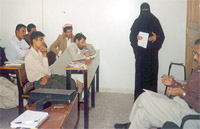
Faculty of Education, Saa’dahCampus Causerie [Archives:2003/643/Education]
June 19 2003
 |
 |
Level-4 (English)
Faculty of Education
Sa'adah
The students of level-4 (English) of the Faculty of Education, Sa'adah, came bouncing down to participate in a symposium on E.M. Forster's A Passage to India organized by the Department of English on May 21. Describing the event as a ” baby step” on the part of students, Dr Murari Prasad, the head of the department, warmed up the session and asked the participants to get cracking and articulate their points. The speakers, though jumpy and jittery at the outset, plucked up enough guts to face the audience including their peers and teachers.
The first speaker, Yahia Ahmad Kaid Ali, outlined the locale and setting of the novel and discussed extensively the East-West encounter , the novel's main theme. The narrative account of the book was presented in detail by Ahmad Jaber Mohammed Ahmed while Ibrahim Mohammed Hadi focused on the colonial mentality of the British rulers in India. He appreciated Forster's scathing indictment of the stunted sensibility of the British officials but found the book lacking in robust sympathy for Indian nationalism.
The issue of racial arrogance was further taken up by Waled Abdu Mohammed Gassim, who referred to the downright nasty snubs of the British Club members and dealt with the disappointing conclusion of the novel. The flip side to Fielding's charitable view of India based on human norms and Mrs Moore's warm vibrations was presented by Ibrahim Sham suddin with reference to the apparently intractable opposition of hardening British overlordship and Indian resistance. The standing gulf between India and Britain recurred in the presentations made by Abdu Ali Hassan, Aidh Mospher Eydah Naji, Hussain Mohsin and Rawdah Abdalla.
The nucleus of the narrative featured prominently in Afrah Abdul Kaffee's submission. As she put it, the crux of the novel is the sustained encounter between the English colonials and India but Forster's incomplete resolution makes the outcome of such intermittent crossings or common humanity across the colonial divide pretty uncertain. Since the injunction 'only connect' could not be sustained, a much deeper structural integration was needed but from all accounts it was not imaginable in the situation portrayed by Forster.
In his critique of Forster's liberal humanism, Mr Khalid Sabri pointed out that conflicts caused by colonialism are not amenable to liberal solution and so despite hopes of conciliation , familiar cultural opposition persists. He found Forster leaning on colonialist preconceptions in his view of India as incomprehensible, baffling, enigmatic, vast and mystifying.
Dr S.C. Satapathy, currently visiting professor at the faculty of Education, Sa'dah, said that Forster's novel has evoked varied response from readers as well as critics ever since its publication. Their interest still remains undiminished and every reading of the text throws up new challenges while providing fresh insights into human situations. The issue Forster raised in A passage to India )- can we reach out to one another and successfully connect breaking the bounds of history , religion,race,region,colour,and culture and such other man-made artificial frontiers thereby bonding ourselves into a universal unity? ) still remains unresolved. Colonialism has not been eradicated from the planet; it has only returned in complex forms. Fortunately, Forster has offered us a way out of the muddle. One could transcend the limitations of time and space, rise to a state of heightened consciousness where the wasp, Mrs. Moore, Aziz, India, the animate and the inanimate merge and melt into one and the same achieving the universal unity through love. This is ” Bhakti”.
In the end , Dr Murari Prasad lauded the performance of participants and pepped up their enthusiasm. He urged on the students to read the text closely and become 'informed' responsible readers. Only by a close reading of the book under discussion,or for that matter any other literary text, can they place themselves in a cultural and historical context and respond to it with a certain measure of confidence. In his concise remarks on A Passage to India, he said that Forster's co-ordinates and his attempt to understand India by way of a Western vocabulary of liberal tolerance can be understood and evaluated better by reading his book alongside Edward Thomson's A Farewell to India . It's true that Forster is not a crusading opponent of British policy in India in that his opposition to the iniquities of empire is not politically articulated; nevertheless A Passage to India is a triumphant expression of the British imagination exploring India.
Finally, he announced amidst cheers that such activities would be periodically organized in the future to enable the students to formulate their points of view, to renegotiate their protocols of reading and sharpen their insight so that in the fullness of time they can flower into perceptive readers of literature.
——
[archive-e:643-v:19-y:2003-d:2003-06-19-p:education]


